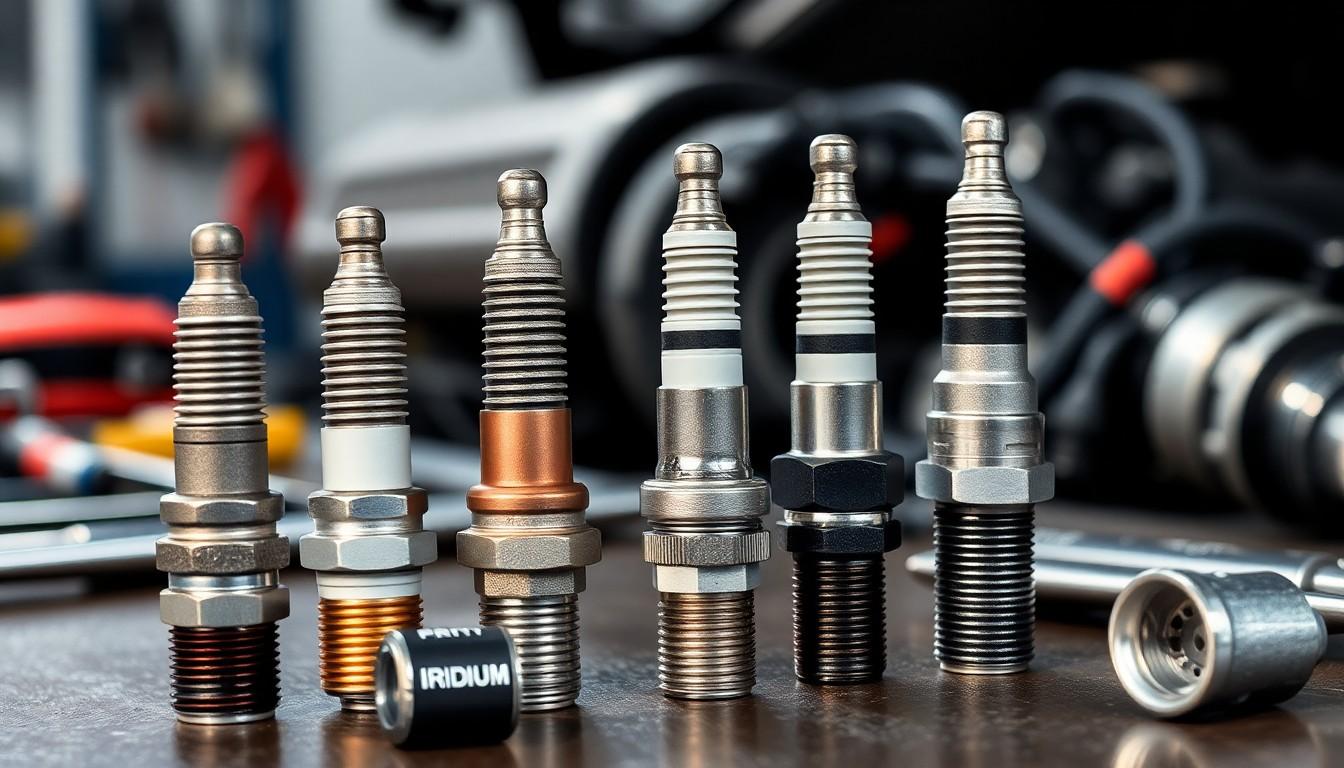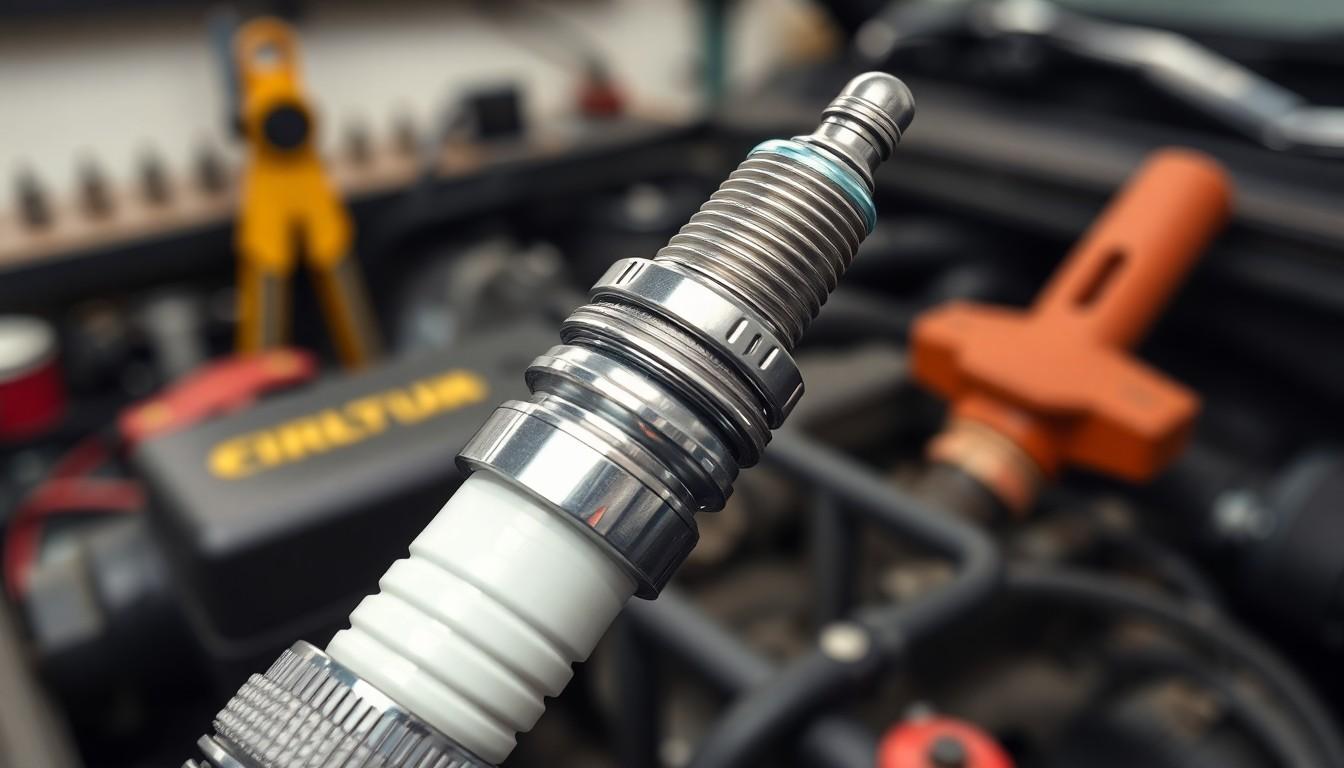Ever wondered what keeps your car engine running smoothly? The humble spark plug might be small, but it’s one of the most crucial components under your hood. Without it, your vehicle simply wouldn’t start—let alone get you where you need to go.
We’ve helped thousands of drivers understand their vehicles better, and spark plugs are often overlooked even though their vital role. These small devices create the electric spark that ignites the fuel-air mixture in your engine’s combustion chamber, transforming chemical energy into the mechanical power that moves your car forward. When they’re functioning properly, you’ll enjoy better fuel efficiency, smoother acceleration, and fewer emissions.
What Is a Spark Plug?
A spark plug is a small but critical component in internal combustion engines that creates the electric spark necessary to ignite the fuel-air mixture inside the combustion chamber. These finger-sized devices feature a center electrode insulated by porcelain and a ground electrode that creates a small gap where the spark jumps across. Every gasoline-powered vehicle contains multiple spark plugs—typically one for each cylinder in the engine.
The basic design of spark plugs hasn’t changed significantly since their invention in the early 1900s. Each plug connects to the ignition system that supplies the high voltage electricity (20,000-100,000 volts) required to create a powerful spark. This electrical connection occurs through the terminal at the top of the plug, which links to the ignition coil via spark plug wires or coil-on-plug systems in modern vehicles.
Spark plugs come in various heat ranges and designs to match exact engine requirements. Performance vehicles often use iridium or platinum-tipped plugs for better durability and ignition efficiency, while standard vehicles may use copper-core plugs. The material composition directly affects both the lifespan and performance characteristics of the spark plug in different driving conditions.
The Primary Function of Spark Plugs

Spark plugs serve a crucial role in internal combustion engines by creating the electric spark that ignites the air-fuel mixture in the combustion chamber. These small components generate voltage between 12,000 to 45,000 volts, which is essential for your engine’s operation.
Igniting the Air-Fuel Mixture
Spark plugs feature a central electrode and a side electrode with a small gap between them. When high voltage electrical current flows from the ignition system, it creates a important voltage difference across these electrodes. The gap between electrodes allows the current to ionize the surrounding gases once the voltage exceeds their dielectric strength. This ionization transforms the gases into conductors, enabling a powerful spark to jump across the gap. Temperatures in this spark channel can briefly reach up to 60,000 K, causing rapid gas expansion similar to a miniature explosion. Precise timing of this spark is controlled by your engine’s management system to ensure optimal combustion efficiency.
Creating the Combustion Process
The spark initiates a chain reaction within the compressed air-fuel mixture inside the combustion chamber. This ignition converts chemical energy stored in the fuel into mechanical energy that powers your vehicle. Combustion pushes the piston downward, creating the rotational force that’s transferred through the crankshaft to eventually move your car. Efficient combustion directly impacts engine performance, fuel economy, and emissions levels. Properly functioning spark plugs deliver consistent, powerful sparks that ensure complete combustion of the fuel mixture. Any deterioration in spark plug performance can lead to reduced power output, increased fuel consumption, and higher levels of harmful emissions from your vehicle’s exhaust system.
How Spark Plugs Work in an Engine

Spark plugs operate through a precise electrochemical process that converts electrical energy into the thermal energy needed for combustion. The functioning involves a carefully orchestrated sequence where high voltage electricity jumps across an electrode gap, creating a spark that ignites the compressed fuel-air mixture in the combustion chamber.
The Spark Plug Firing Sequence
The firing sequence of spark plugs follows a synchronized pattern that maximizes engine efficiency and power output. Spark plugs fire at the exact moment when the piston reaches the top of its compression stroke, ensuring optimal ignition timing for the compressed fuel-air mixture. This critical timing is managed by the engine’s ignition system, which coordinates with other engine components to maintain proper operation. Modern vehicles use sophisticated computer systems to adjust the firing sequence based on various factors including engine load, temperature, and throttle position for enhanced performance.
Electrical Components and Voltage Requirements
The electrical system powering spark plugs consists of several interconnected components working together to generate and deliver the necessary voltage. An ignition coil or magneto produces the high voltage (typically 12,000-25,000 volts) required to create an effective spark across the electrode gap. Spark plug wires transport this high voltage from the ignition source to each individual spark plug without energy loss. Inside the spark plug itself, current flows from the central electrode through the gap to the side electrode, creating ionization of gases between them. This ionization process transforms the normally insulating air-fuel mixture into a conductive path, allowing current to flow and generating a spark channel with temperatures reaching approximately 60,000 K. The intense heat creates a small explosion-like reaction that expands rapidly, forming a fireball that initiates complete combustion of the surrounding fuel mixture.
Types of Spark Plugs

Spark plugs come in several different materials, each offering unique benefits for exact vehicle types and driving conditions. Understanding these variations helps car owners make informed choices when replacing spark plugs to optimize engine performance and longevity.
Copper Spark Plugs
Copper spark plugs feature a solid copper core electrode that excels at conducting both electricity and heat. These plugs represent the most affordable option on the market while delivering good conductivity for reliable ignition in older vehicles. Due to their softer metal composition, copper plugs typically need replacement every 30,000 to 50,000 miles, making them less durable than other options. Many classic cars and lower compression engines perform optimally with copper spark plugs even though their shorter lifespan.
Platinum and Iridium Spark Plugs
Platinum spark plugs incorporate a platinum tip on the electrode, significantly improving durability and resistance to wear compared to copper variants. These plugs can last up to 100,000 miles or more, making them a cost-effective long-term investment for modern vehicles. Their superior corrosion resistance and ability to withstand higher temperatures make platinum plugs ideal for newer cars with higher compression engines.
Iridium spark plugs represent the premium option, utilizing an iridium-tipped electrode with an even higher melting point and durability than platinum. These plugs boast the longest lifespan among all types, frequently lasting up to 120,000 miles or beyond. Their exceptional ability to maintain a consistent spark gap over time ensures superior ignition efficiency. High-performance vehicles particularly benefit from iridium plugs’ outstanding fouling resistance and consistent performance characteristics.
Signs of Failing Spark Plugs

Failing spark plugs often manifest through several noticeable symptoms in your vehicle’s performance. Recognizing these warning signs early can help prevent more serious engine problems and costly repairs down the road.
Poor Engine Performance
Engine misfires represent one of the most common indicators of spark plug failure, causing rough idling and inconsistent power delivery. Your vehicle might stumble or hesitate during acceleration as worn spark plugs struggle to ignite the fuel-air mixture properly. Starting difficulties become increasingly apparent, especially in cold weather conditions, when failing spark plugs lack the necessary voltage to create an effective spark. Many drivers also experience a important decrease in engine power as the combustion process becomes less efficient due to inadequate spark generation.
Reduced Fuel Economy
Fuel consumption increases noticeably when spark plugs fail to function at optimal levels. The inefficient combustion process forces your engine to use more fuel to maintain performance, resulting in more frequent trips to the gas station. Your engine strains to compensate for poor ignition, working harder to generate the same power output and so burning more fuel. Tracking your mileage reveals this gradual decline in fuel efficiency, often dropping 10-20% below your vehicle’s normal range. Modern vehicles with onboard diagnostics may also trigger check engine lights when spark plug-related issues affect the emissions system due to incomplete combustion.
Proper Spark Plug Maintenance

Proper maintenance of spark plugs ensures optimal engine performance and longevity. Regular inspection and timely replacement of these critical components help maintain fuel efficiency while preventing more serious engine issues.
When to Replace Your Spark Plugs
Spark plugs typically require replacement at exact intervals determined by your vehicle manufacturer, ranging from 30,000 to 100,000 miles depending on the plug type. Performance issues such as engine misfiring, decreased fuel efficiency, or difficult starting often indicate worn spark plugs that need replacement. Visual inspection remains a reliable method for determining spark plug condition—important electrode wear, heavy carbon deposits, or obvious fouling necessitate immediate replacement regardless of mileage. Many modern vehicles equipped with copper plugs need replacements every 30,000-50,000 miles, while platinum and iridium versions can last substantially longer.
Choosing the Right Spark Plug for Your Vehicle
The heat range of a spark plug plays a crucial role in its performance, with cold spark plugs designed for high-performance engines operating at high RPMs under heavy loads. Hot spark plugs work better in engines with low to moderate loads and RPMs, helping prevent fouling in vehicles that frequently idle or operate at lower speeds. Engine specifics dictate the appropriate choice—forced induction, turbocharged, or supercharged engines benefit from cold spark plugs that resist overheating and pre-ignition. Material composition affects both durability and performance, with copper plugs offering affordability but shorter lifespan, while platinum and iridium versions deliver extended service intervals for modern vehicles. Following manufacturer specifications ensures you’re selecting the correct spark plug type and heat range for your exact vehicle, optimizing both performance and engine protection.
Conclusion
Spark plugs may be small but they’re vital to your vehicle’s operation. These powerful components create the spark that ignites your engine’s fuel-air mixture transforming chemical energy into the mechanical power that drives your car.
With various materials like copper platinum and iridium available it’s crucial to select the right plug for your exact vehicle. Regular maintenance and timely replacement ensure optimal engine performance improved fuel efficiency and reduced emissions.
By understanding spark plug function and recognizing early warning signs of failure you’ll extend your engine’s life and avoid costly repairs. Remember that this tiny component plays an outsized role in keeping your vehicle running smoothly day after day.
Frequently Asked Questions
What is a spark plug and why is it important?
A spark plug is a critical component in internal combustion engines that creates the electric spark needed to ignite the fuel-air mixture in the combustion chamber. It’s vital because it initiates the combustion process that converts fuel into mechanical energy, powering your vehicle. Without properly functioning spark plugs, your car won’t start or run efficiently, resulting in poor performance, increased fuel consumption, and higher emissions.
How do spark plugs work?
Spark plugs work by generating a high-voltage electric spark (12,000-45,000 volts) between two electrodes. When the voltage jumps across the gap, it creates a spark that ignites the compressed air-fuel mixture in the cylinder. This controlled explosion pushes the piston down, creating mechanical energy that powers your vehicle. The entire process is precisely timed by your engine’s management system to ensure optimal combustion efficiency.
What are the different types of spark plugs?
There are three main types of spark plugs: copper, platinum, and iridium. Copper plugs are affordable but last only 30,000-50,000 miles. Platinum plugs offer better durability, lasting up to 100,000 miles. Iridium plugs are premium options with the longest lifespan (up to 120,000 miles) and provide superior ignition efficiency, making them ideal for high-performance vehicles. The material composition affects both performance and lifespan under various driving conditions.
How often should spark plugs be replaced?
Spark plug replacement intervals vary by type and vehicle specifications. Copper plugs typically need replacement every 30,000-50,000 miles, platinum plugs every 60,000-100,000 miles, and iridium plugs every 80,000-120,000 miles. Always follow your vehicle manufacturer’s recommended maintenance schedule. Regular inspection and timely replacement ensure optimal engine performance, fuel efficiency, and emissions control.
What are signs of failing spark plugs?
Signs of failing spark plugs include engine misfires, rough idling, difficulty starting (especially in cold weather), decreased engine power, and reduced fuel efficiency (10-20% drop). You might also experience poor acceleration, engine surging, or a check engine light on your dashboard. Modern vehicles may trigger warning lights when spark plug issues affect the emissions system due to incomplete combustion.
Can the wrong spark plugs damage my engine?
Yes, using incorrect spark plugs can damage your engine. Spark plugs with the wrong heat range can cause pre-ignition, detonation, or overheating. Plugs that are too hot may cause engine knocking and piston damage, while plugs that are too cold might lead to carbon buildup and fouling. Always follow manufacturer specifications for the correct type, gap size, and heat range to protect your engine and maintain optimal performance.
How do spark plugs affect fuel efficiency?
Spark plugs directly impact fuel efficiency by determining how completely your fuel burns. Worn or fouled plugs create weak sparks that result in incomplete combustion, wasting fuel and reducing power. Properly functioning spark plugs ensure optimal combustion, which can improve fuel economy by 10-20% compared to worn plugs. They also reduce emissions and provide smoother engine operation and better acceleration.
What is the heat range of a spark plug?
The heat range refers to a spark plug’s ability to transfer heat from the firing tip to the cooling system. “Hot” plugs dissipate heat slowly and are designed for engines with lower loads or colder operating conditions. “Cold” plugs transfer heat quickly and are suited for high-performance or high-compression engines. Using the correct heat range prevents overheating, pre-ignition, and carbon buildup.

